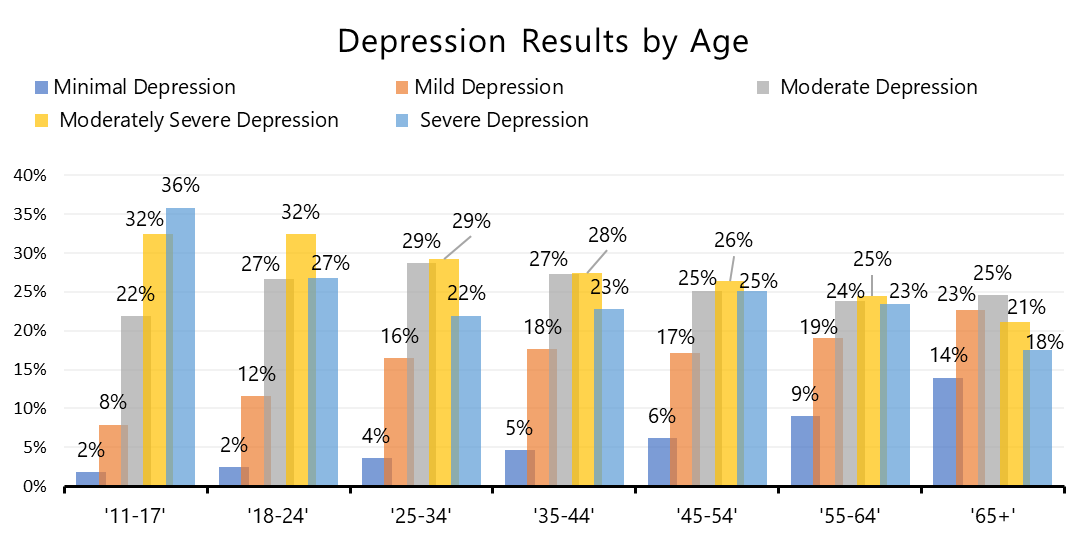You are here
Online Depression Screening: Data and Statistics
Screening improves the chances of getting treatment. Primary care physicians providing usual care miss 30% to 50% of depressed patients and likely fail to recognize many common mental health disorders. However, when results from a positive screening are included in the chart, doctors were over 3 times more likely to recognize the symptoms of mental illness and to plan to follow-up with people about their mental health concerns.1-3
MHA provides individuals with free, anonymous, and confidential screening tools that allow people to explore their mental health concerns and bring results to a provider through our MHA Screening program (at www.mhascreening.org). The site hosts scientifically validated screening tools commonly used by mental health and primary health practitioners. MHA Screening started with just four screens: depression, anxiety, bipolar, and PTSD. Over time we added screens for substance and alcohol use, youth and parents, and psychosis. In 2017, we launched Spanish language screens for depression and anxiety and an eating disorder screen.
As part of our program, we asked users to share voluntary demographic data. The analysis of screening results has assisted in the development of public education campaigns, needs assessments, and program development to better meet the needs of individuals, families and communities seeking supports online.
The screening most often taken by users online has been the depression screen (the Patient Health Questionnaire-9 or PHQ-9). Today, an average of 2,700 individuals come online to take a screen per day, and about 50 percent of those screens are depression screens. This report includes analysis of our state level data from our depression screens from May 2014 through December 2016 and demographic data analysis from 2016.
Download the Full Online Depression Screening Report
Key Findings
- Most people screened for Moderately Severe or Severe Depression. Among states, only 16 percent of screeners scored Minimal and Mild Depression while 60 percent scored Moderately Severe and Severely Depressed.
- Our youth is at greatest risk of depression and self-harm.

-
Outreach and awareness are critical among members of special populations. The highest proportion of Moderately Severe Depression and Severe Depression results were among LGBTQ and students.
-
Those with a greater need for treatment, cannot afford it. Females and males reporting household income of less than $20,000 a year scored highest rates of Severe Depression. This was true across all racial and ethnic groups.
Next Steps
- One out of 3 screeners report that they do not plan to take any action after screening. Another third of screeners state that they plan to talk to someone.

-
Young screeners (11-17) were least likely to seek treatment, and most likely to take no action.
-
Low-income screeners showed a great interest for taking next steps, but socio-economic barriers may prevent them from acquiring mental health services.

Additional Analysis
The report provides further analysis of the following topics:
- Depression screening results by state; and
- Self-harm and suicidal ideation overall and by state; and
- Sex, age, race and income demographics for screenings results and next steps after screening.
Download the Full Online Depression Screening Report
1 Christensen, K. S., Toft, T., Frostholm, L., Ørnbøl, E., Fink, P., & Olesen, F. (2005). Screening for common mental disorders: who will benefit? Results from a randomised clinical trial. Family practice, 22(4), 428-434.
2 Pignone, M. P., Gaynes, B. N., Rushton, J. L., Burchell, C. M., Orleans, C. T., Mulrow, C. D., & Lohr, K. N. (2002). Screening for depression in adults: a summary of the evidence for the US Preventive Services Task Force. Annals of internal medicine, 136(10), 765-776.
3 O’Connor, E. A., Whitlock, E. P., Beil, T. L., & Gaynes, B. N. (2009). Screening for depression in adult patients in primary care settings: a systematic evidence review. Annals of Internal Medicine, 151(11), 793-803.







this page